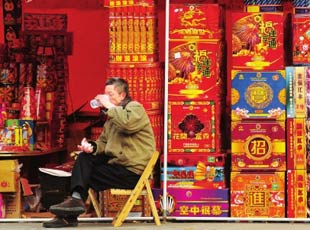Chinese heed calls to fight smog and extravagance
Xinhua, March 2, 2014 Adjust font size:
This year's Spring Festival holiday, which ended yesterday, was celebrated less luxuriously and with fewer fireworks following national calls to fight smog and extravagance.
The reduction in the number of fireworks was particularly noticeable in Shanghai, where the maximum density of PM2.5, the tiny particles particularly hazardous to health, reached 290 micrograms per cubic meter on January 31, 45 percent down from last year.
In east China's Jiangxi Province, workers and volunteers at the Tianciliangyuan Community in Nanchang, the capital, distributed electronic firecrackers.
"Traditional firecrackers with suffocating smoke would worsen the already poor air quality. E-firecrackers, at a similar cost, emit no pollution and can be reused in the future," said 62-year-old volunteer Xu Xuehua. "The severe smoggy weather forced us to take action, turning to e-firecrackers and festive music instead of fireworks."
Chinese people traditionally celebrate the Lunar New Year with fireworks to fend off evil spirits. However, with smog suffocating the country in recent years, the contribution of fireworks to air pollution has drawn the attention of authorities. Many cities issued circulars calling on residents to cut down during the holiday.
Burning incense is another tradition that affects air quality during the Spring Festival with visitors to Buddhist and Taoist sites burning incense and praying for blessings.
Beijing's Lama Temple provided environment-friendly incense free and barred visitors from bringing their own.
The incense is shorter and made from natural materials which produce smoke meeting environmental requirements, according to the temple's abbot.
Postcard and calendar sales also fell sharply this year, following a circular banning the spending of public money on such items as New Year gifts.
"The total value of postcard and calendar orders dropped from 2 million yuan (US$333,000) to 3 million yuan last year to only 200,000 to 300,000 yuan," said a manager at the Jingwei Printing Plant in Guiyang, capital of southwest China's Guizhou Province.
He said most government departments and state-owned enterprises, once the plant's main clients, had canceled orders.
An increasing number of people sent greetings online and by using their phones instead.
Tencent said the number of messages sent via its WeChat service on the eve of Spring Festival doubled from last year, with 10 million sent in a single minute at the peak period.
Mobile phones were also used to send electronic versions of hongbao, the red envelopes of cash given during the holiday. People who receive e-hongbao can cash them by linking their debit cards to WeChat.
The company said more than 5 million users collected e-hongbao between Spring Festival eve and 4pm the next day.
Despite the global economic slowdown, China's consumer market boomed during the holiday, according to the Ministry of Commerce.
However, sales of luxury items, such as expensive alcohol and rare seafood, sometimes sent as gifts to officials, fell sharply.
"We often struggled during the Spring Festival period, as it was hard to decide what we should bring as New Year gifts to our superiors and how we should present them," said an official in Ji'an in Jiangxi Province.
He said frugality campaigns meant he no longer faced that pressure.


